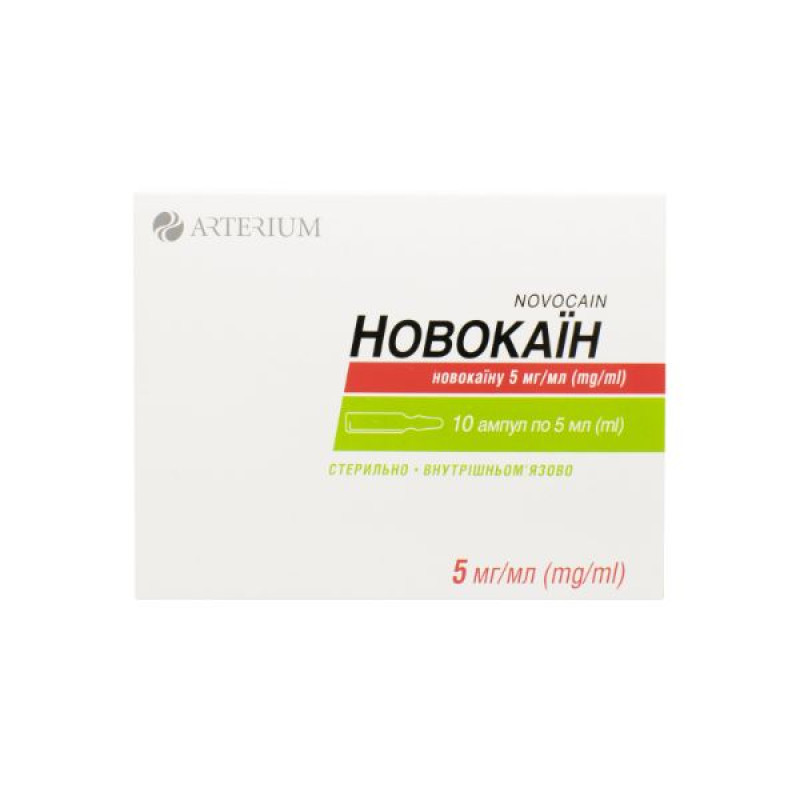Novocaine solution for injection 0.5% ampoule 5 ml No. 10

Novocaine is a drug for local anesthesia. Indications for use are local and infiltration anesthesia, therapeutic blockades.
Warehouse
1 ml of solution contains novocaine (procaine hydrochloride) 5 mg; excipient: water for injection.Contraindication
Increased individual sensitivity to the drug.
Myasthenia gravis, arterial hypotension, purulent process at the injection site, urgent surgical interventions accompanied by acute blood loss, pronounced fibrous changes in tissues (for anesthesia by the method of creeping infiltrate).
Method of application
With local anesthesia, the dose of the drug depends on the concentration, nature of the surgical intervention, method of administration, condition and age of the patient. With paranephral blockade, adults should inject 50-70 ml of 0.5% (5 mg/ml) novocaine solution into the perirenal tissue. For infiltration anesthesia, the following highest doses are established (for adults): the first single dose at the beginning of the operation is 0.75 g (150 ml of 0.5% novocaine solution). Further, during each hour of the operation, no more than 2 g (400 ml of 0.5% novocaine solution).
Application features
The drug should be used with caution in patients with a history of severe allergies, in conditions accompanied by decreased hepatic blood flow, progression of cardiovascular failure (usually due to the development of heart blocks, heart rhythm disturbances, especially bradycardia and shock), inflammatory diseases, pseudocholinesterase deficiency, renal failure, in elderly patients (over 65 years of age), seriously ill, debilitated patients, during pregnancy, during childbirth and breastfeeding.
When using the drug, monitoring of the function of the cardiovascular, respiratory and central nervous systems is necessary.
To reduce and eliminate adverse reactions, it is necessary to use antihistamines and corticosteroids.
Procaine is not suitable for superficial anesthesia due to its poor ability to penetrate intact mucous membranes.
When performing local anesthesia, when using the same total dose, the toxicity of procaine is higher, the more concentrated the solution is. In this regard, with increasing solution concentration, it is recommended to reduce the total dose or dilute the drug solution to a lower concentration (with sterile isotonic sodium chloride solution).
Pregnant women
Use during pregnancy is possible provided it is well tolerated.
Children
There is no experience with use in children.
Drivers
During the treatment period, caution should be exercised when driving vehicles and engaging in other potentially dangerous activities that require increased concentration and speed of psychomotor reactions.
Overdose
Symptoms: pallor of the skin and mucous membranes, dizziness, nausea, vomiting, increased nervous excitability, "cold" sweat, tachycardia, decrease in blood pressure almost to the point of collapse, tremor, convulsions, apnea, methemoglobinemia, respiratory depression, sudden cardiovascular collapse.
The effect on the central nervous system is manifested by a feeling of fear, hallucinations, convulsions, and motor agitation.
Treatment: in cases of overdose, the drug should be stopped immediately. When performing local anesthesia, the injection site can be pricked with adrenaline. General resuscitation measures, including oxygen inhalation, if necessary, artificial ventilation of the lungs. If convulsions last more than 15-20 seconds, they are stopped by intravenous administration of thiopental (100-150 mg) or diazepam (5-20 mg). In case of arterial hypotension and/or myocardial depression, intravenously administer ephedrine (15-30 mg), in severe cases, conduct detoxification and symptomatic therapy.
Side effects
Neurological disorders: headache, dizziness, drowsiness, weakness, motor restlessness, loss of consciousness, convulsions, trismus, tremor, visual and auditory disturbances, nystagmus, cauda equina syndrome (paralysis of the legs, paresthesias), paralysis of the respiratory muscles, motor and sensory block, return of pain, persistent anesthesia.
Cardiovascular system: increase or decrease in blood pressure, peripheral vasodilation, collapse, bradycardia, arrhythmias, chest pain.
From the urinary system: involuntary urination.
Gastrointestinal: nausea, vomiting, involuntary defecation.
From the blood and lymphatic system: methemoglobinemia.
On the part of the immune system: allergic reactions, including skin reactions - itching, rash, dermatitis, skin peeling, hyperemia; other anaphylactic reactions.
Storage conditions
Store in original packaging at a temperature not exceeding 25 ° C. Keep out of the reach of children.
There are no reviews for this product.
There are no reviews for this product, be the first to leave your review.
No questions about this product, be the first and ask your question.

